Filling the Void: Why the EU Must Step Up Support for Russian Civil Society
27 April 2018
Over the past 15 years, the space for civic engagement in Russia has continuously shrunk, and it looks set to be cut further during Vladimir Putin’s fourth presidential term. Following a wave of repressive measures, it is already more restricted than it has been since 1991. Non-governmental organisations and activists have been stripped of funds as their activities have been criminalised.
They increasingly face a double disconnect: from international partners and within their own society. The clampdown on civil society reflects the growing repression of Russian society as a whole. But growing local initiatives and rising protests across the country undercut the narrative that Russian civil society is dead.
And despite the pressure, Russian civil society is proving to be more active, resilient and diverse than is generally assumed. It continues to have new ideas and the capacity to be a key agent of development and social change in Russia. Many groups and individuals continue to have a vision for the country’s future and are willing to work with Western partners. The example of Ukraine shows that civil society is an indispensable factor in overcoming the authoritarian legacy of post-Soviet societies.
ENJOYING THIS CONTENT
